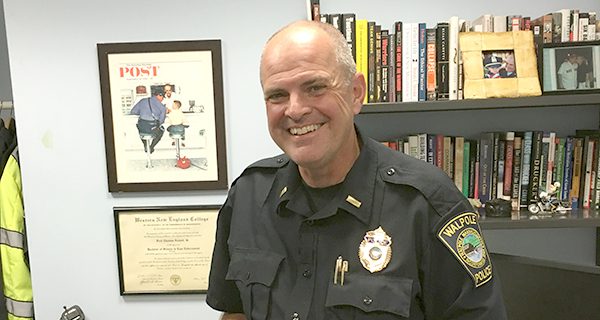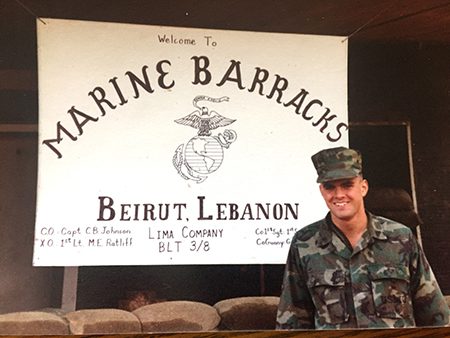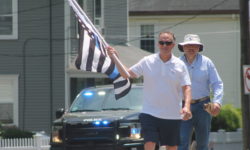[ccfic caption-text format="plaintext"]
By Linda Thomas
Hometown Weekly Correspondent
The boy’s legs didn’t look like any that Fred Leland had ever seen.
There was something about the young boy walking around wounded but still full of life. It seemed, Leland thought then, that the boy hadn’t realized his infection was serious due to his injuries.
“We had a language barrier,” Leland said. “But his non-verbal communication told me he trusted us and knew we were there to help. It was just a feeling I had, but it was a powerful one that stuck with me and made me realize we can make a difference even how small it matters.”
It was fall, 1982. A teenage Marine, Leland was in Beirut as part of the multinational peacekeeping unit in Lebanon. He was a squad leader setting up his unit’s perimeter line when he saw the eight-year-old Lebanese boy could barely walk — his legs looking like “puffed up balloons.” So, he and a Navy corpsman approached the boy and saw he’d suffered a minor scrap that had become infected. Leland had the boy moved to a Navy hospital ship, where he was treated and eventually recovered.
“There was something about my time in the Marine Corps that affected me in a deeply positive way. I was proud and excited, said Leland, acknowledging his time in the military helped to spur him on the path of joining the police force.
Leland might be described as an instrument of peace, having spent the past 36 years on the battlefield as a Marine — and on the streets as a police officer. His time as a young soldier in Lebanon, a newbie sheriff’s deputy in Florida, and a veteran officer in Walpole has given him a unique perspective on the best ways of reconciling challenges.
Leland is founder and principal trainer of LESC (Law Enforcement and Security Consulting). In fact, he even co-authored a book with Donald Vandergriff (a retired major in the U.S. Army) in 2013: “Adaptive Leadership Handbook — Law Enforcement & Security: Innovative Ways to Teach and Develop Your People,” designed to develop adaptive thinking and leadership abilities in those on the bleeding edge of today’s law enforcement and security challenges.
Two years ago, he formed for Walpole CCIT (Community Crisis Intervention Team) and is community liaison for mental health for the Walpole police. CCIT is designed to improve the way law enforcement — and the community — respond to people experiencing mental health crises. The program is a partnership of law enforcement agencies, mental health providers and individuals and families affected by mental illness.
Leland turned 18 on September 3, 1980, and 18 days later joined the U.S. Marine Corps. He had no clear career direction. He was just “serving my country.”
From September 1982 to March 1983, he was assigned to the 3rd Battalion 8th Marine Regiment and the 2nd Marine Division. It was a tough time for the United States. The Cold War was at its height and the Iranian hostage crisis was going on.
“As a young kid, I didn’t know what I wanted to do initially,” Leland said. “But once I got in the Marine Corps, I realized I liked helping people. I felt we were influencing people in their time of need. That was a powerful feeling I felt often while I was there.”
His time in Lebanon involved helping keep the Israelis out of West Beirut. There was a lot of fighting and many injuries.
Leland and five other Marines were picked to train the Lebanese armed forces. One of the units he trained included a then 18-year-old Tony Saliba.“He’s a great great guy,” said Saliba, grateful for Leland’s part in establishing peace in the region.
Saliba left his country in 1987 and came to the United States, making Foxboro his home. In 2007, he went to the Walpole Police Station for business and spotted Leland. Both looked at each other and said the other man looked familiar. They started to talk and realized they had met in Lebanon in 1982.
After his time in the military, Leland lived in Walpole for about five years before moving his young family to Florida, where he worked for the Charlotte County Sheriff’s Office. He stayed for a couple of years before returning to Walpole with his wife Nancy and their two small children (Danielle, now 29) and Joseph (now 26). The couple now has two grandsons: Mark (3) and Jack (2).
In 2001, Leland was promoted lieutenant with the Walpole Police Department.
He says that 95 percent of police work is positive — “helping people in a host of different ways, whether kids struggling with addictions or mental health, helping them instead of arresting them. We’re trying to keep them out of the criminal justice system and into where they can get help.
“A big piece of what I do is what everybody else does … it’s a big ‘we’ thing … not a ‘me’ thing. … One person isn’t enough. You need to have everybody involved.”
The negativity around police work because of officers killing African Americans, Latinos or any other race is unwarranted, Leland said.
Officers make roughly 60 million contacts a year nationwide and use physical force in 1.4 percent of those contacts and deadly force in 0.0002 percent of the incidents, Leland notes — and so, the chances are very slim that someone will be shot and killed by a police officer.
Many people believe officers are doing things intentionally but they’re not, Leland said.
“It’s sad,” he said. “You know you’re out there trying to do the right thing and as a human being it hurts to see this profession … a noble profession … being treated in the way that it is.”
Leland said he tries to use his skills to defuse situations that can go bad and possibly become a police shooting.
“We can slow things down to improve things,” he said. “We have to think smarter and less emotional in our response and more strategic and tactical in our responses. We have to consider the strategy and tactics we use and how they affect the moral, mental and physical.
“It’s great to win the physical realm on the street in a fight. But if people are looking at it after it’s over and say, ‘Wait a minute, what these policemen are doing isn’t right,’ then we lose that moral ground. And once a police officer loses the moral high ground or even the perception of it, then we start losing people.”
Patrolman Heather Van Ness gave an example of when a better approach – involving Leland – worked out.
“Neighbors just didn’t get along and bickered with one another and called the station for every little thing,” she said. “They were up three or four times a shift, even involving court intervention.”
Leland invited the two neighbors involved to the station to resolve their differences.
“They talked about their issues and made peace, and now they’re friends,” she said. “And Fred has done that quite a few times.”
Leland says he believes in the job and in the community. And law enforcement is only a small piece of his job.
“It’s important, but it’s only a small percentage of what we do,” he said. “All this other work goes unseen except by the people you’re helping.”
The crisis community intervention program, for example, came about when Leland saw incidents in the town involving mental illness.
“We often have a revolving door going on,” he said. “We go in. Take the person out. We get her help for the night. And she’s back home tomorrow. And we do it all over again.”
Robin Chappell, health director for Walpole, describes Leland as “a hero” for how he and the police department have tackled the city’s mental health problems.
“A lot of times when we have a mental health case in Walpole, police get called out … and get called out … and it’s very time consuming,” Chappell said. “Fred said he wasn’t going to keep his guys on the job and rather he would come out and he would work with the caseworker or the probation officer.”
Working with others, Leland helps people in crisis find a job, receive treatment or get services to keep them from despair or, worse, going to jail.
“Now, the police are not called every week at the same address and the number of cases has gone down now that everybody’s working together,” Chappel said. “It was all because of Fred Leland. One hundred percent because of Fred.”
Leland grew up the oldest of seven. He grew up in the “old school” way of life. His father worked. His mother stayed home. And you played ball. Everyone in the neighborhood took care of each other.
He remembers when police had more discretion.
For example, he recalls one night when his father had a couple of beers and needed to go to the local coffee shop and didn’t want to drive. “I was 13,” Leland recalled, “and he asked me at 1 in the morning to drive him. So, while my father went inside the coffee shop … with a slew of police officers inside … I sat in the driver’s seat with my hat practically covering my face. Nobody ever noticed.”
Though he recently retired from the police force after 30 years, Leland continues to ride his peace train — making stops along the way and sending a message of a peaceful co-existence.
“My mission and intent has been to help people in anyway I could,” he said. “And influencing peace and meaningful and lasting change in the lives of people and police officers has indeed been part of that.”
Still, the image of that young Lebanese boy remains vivid in Leland’s mind, remembering how up and functioning the boy was despite his injuries.
“It wasn’t something out of a movie with gunfire and explosions,” he said. “It was a calm day and his injuries were clear — older from days or even weeks before we came in contact with him, which made it seem all the more real, all the more sad, yet all that more important as the circumstances were not urgent.
“But it made getting him help seem somewhat more fitting with what we the United States Marine Corps were there to do. Keep the peace.”
Editor’s Note: Linda Thomas writes for Hometown Weekly Publications. For comments and suggestions she can be reached at lindasfaces@gmail.com


























